Imagine you’re on a fun camping trip, but dangers are lurking when you fall asleep or when you return to your tent from a walk. Don’t let these hidden possibilities ruin your fun! Pocketing ten security tips for extra safe and sound camping!
Select a Secured Campground
Make a safe campsite a top priority to protect yourself (and your belongings) while camping.
You should first look for a well-lit and densely populated location. The more eyes on you at all times, the better! Consider locating a site near the campground hosts, who live on-site and are ready to react in emergencies as soon as possible.
Stay within the beaten path if you enjoy camping off the beaten path. The fewer people around you, the easier it is to become a target and the less likely you are to find help in an emergency.
Avoid camping in a narrow area with vegetation and trees surrounding your tents to increase your chances of seeing or catching any potential thieves approaching you.
Establish an Early Warning System
The Classic Tin-Can Alarm
Guess what we can do with a string, soup cans, and small rocks!? A Tin-Can Alarm.
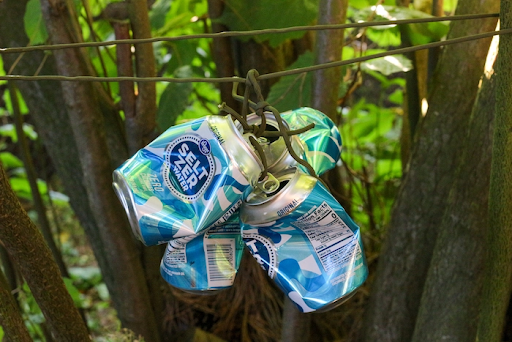
Cut an entry and exit hole in the can that is big enough to thread the string through. Cut the lid wide enough to fit a few rocks – or marbles (as they seem to make a more audible alarm) – inside, then push the lid tight. Lace the thread through numerous cans, leaving enough on either end to knot off the backs and form a string barrier. Make the fence long enough to encompass the breadth of the desired access path. Tie off the ends of the fence with enough tension to pull the system relatively tight and level across the ground. About string options, consider a fishing line – it can work well as 550 paracords but is much lighter.
The ideal height for this system is two to three feet off the ground. It is high enough to prevent moderately sized animals and also low enough to catch thieves off guard and makes them more susceptible to traps.
The Enhanced Window/Door Alarm
If you want a system that is a little more “techie”, you can give window/door security alarms a try. But we will modify it for campsite security purposes.
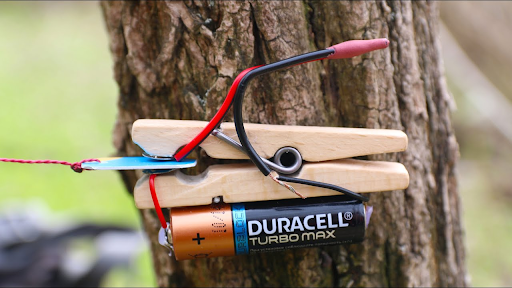
A trip-wire will be installed across the access path. Tie one end of the fishing line to a tree or other secure object. String the wire across the route and secure the other end to a short stick length. Look for anything, such as a tiny wood or rock. With the stick, support the object and keep the rope taut over the path. Place the doorstop alarm beneath the object such that when the trip line is pulled, the stick is dragged out from beneath, enabling the thing to fall on the doorstop and trigger a piercing alarm to startle thieves.
The Cutting-Edge CAPSS3 Solution
For the last and most serious option, you can look for Brite-Strike Technologies, which offers several products for the perimeter alarm market.
The first option is the All Purpose Adhesive Light Strips (APALS) -solar-powered light sticks lasting more than 12 hours on a single charge. The price for an APALS is around $20. It’s smaller than a smartphone, lightweight, and lasts longer than chemical light sticks. Consider buying this efficient alternative instead of leaving room for 15-20 chem lights or battery-powered lanterns in your backpack.
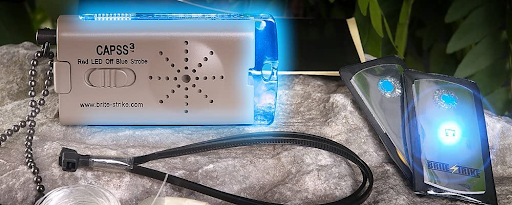
Another product from Brite-Strike is the Camp Alert Perimeter Security System and Survival Signaling System (CAPSS3). It’s lightweight and smaller than a deck of cards, offering security and signaling capabilities. The CAPSS3 device has a 135-decibel auditory alarm unit that is activated by a metallic trip rod integrated into the unit. Pulling the rod out of the unit’s recess sets off the alarm.
The CAPSS3 has two distinct LED dots. A small red light incorporated into the unit’s side serves as a visual alarm and provides red light to read maps or other papers at night. Meanwhile, blue LED light is incorporated into the CAPSS3 throughout its length. It serves as a visual alert and provides more blue light to attract rescuers or indicate one’s location for aircraft search-and-rescue efforts.
A sliding button on the unit’s front allows the lights to be utilized for reading or signaling. A strobe feature may also be used in conjunction with the audio alarm. A tiny key ring is affixed to the triggering rod to enable numerous tripwire connection choices.
Each CAPSS3 device contains two 10-meter-long transparent monofilament lines as a practically undetectable tripwire. The device also includes a tiny strip of heavy-duty 3M double-sided adhesive tape for mounting the CAPSS3 unit to any surface. A few tiny nylon zip ties can secure the device to irregularly shaped surfaces.
The CAPSS3 is around $40 — but the point is each system also includes two blue APALS at no extra cost. Buy one get three!
Safeguard Your Valuables
Another important security measure is to hide any valuables from plain sight. If there are any windows in your tent, ensure you cannot see anything vital through them. This will drastically decrease the chances an opportunistic burglar will break into your tent and steal something!
Better yet, storing valuables in your car is an excellent idea if you’re going on a day hike or are simply away from your tent for any reason. And since it’s more challenging to break into a vehicle’s trunk than a tent, lazy robbers will be deterred.
An even better idea is to leave as many valuables as possible at your house and only take what you need. Every item you leave at home is one less thing to worry about and one less thing to try and keep hidden from potential thieves.
Utilize a Reliable Tent Lock
By attaching to your tent’s zippers, a tent lock prevents attackers from quickly entering your camp while you are resting or away.
Here we recommend a lock with a passcode, as you’ll have fewer things to carry. Let’s think, if you bring one lock and its key, then lose it — What a nightmare! A flexible cable lock is another option because threading through your tent zipper holes is easier.
Of course, camping tent locks can’t completely protect your tent from all thieves or dangers. However, most thieves will choose the one using the least effort, and a tent lock will deter them 90% of the time.
Extra Secure Your Tent with P-Locks
Aside from standard locks, consider P-Locks, a theft deterrent system that anchors your tent on the ground and prevents it from being stolen while camping.
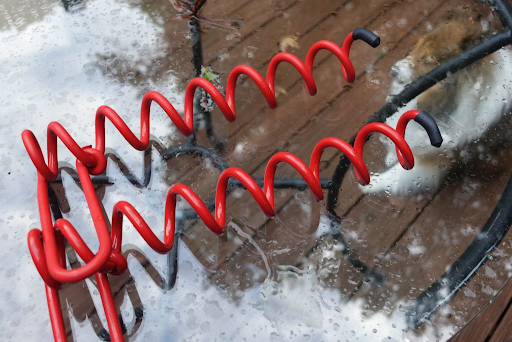
They’re light enough to take them with you anytime and anywhere!
Installing P-Locks is easy as it requires no tools.
After screwing the P-locks into the ground, line up the P shapes and thread your lock through them (lock not included). This will prevent any outward movement and help protect your tent from thieves looking for an easy score.
To force the lockout of the ground, you’d need 1,700 pounds of vertical pressure and 2,900 pounds of horizontal pressure! However, once the lock is removed, outward movement is restored.
While it’s unlikely that a thief will cut open the tent door to steal your stuff, P-Locks will help prevent any thief from stealing your entire tent. Whatever you can keep is fine.
Camping in Numbers for Enhanced Safety
Numbers have strength! Thieves may eschew stealing your belongings if you camp in groups because it’s too dangerous, and they risk being caught. In addition, if you lose something, your friends will be the first to come to your aid.
Bring Your Furry Companion Camping
Along with enjoying nature with you, your dog can do more warnings if necessary. Even though they’re not physically strong or vicious, their loud bark can wake you up at night or alert you of potential animal threats.
Get to Know Your Fellow Campers
As mentioned, the more people are around, the more help you can get. Therefore, you can make friends with other campers who can help you when you ask for it and vice versa.
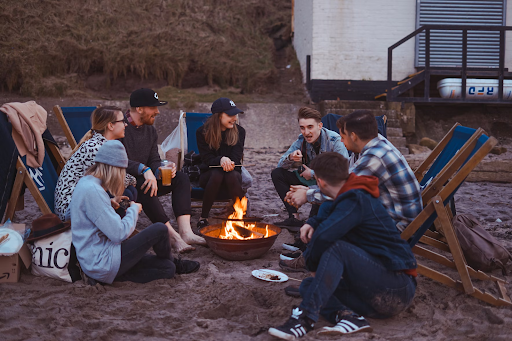
It doesn’t have to be a deep conversation. You can say hello and introduce yourself, or pass by and ask about their campsite location if they are set up.
Small talk may provide information about a person’s characteristics, allowing you to recognize who to contact for assistance.
Be Prepared for Any Situation
In any situation — from a human threat or an animal threat, not your belongings, yourself is the most important. It would help if you took a weapon for self-defense, such as a knife from the survival kit. A gun is your best defense against perceived danger if you’re trained and licensed. Other alternatives include pepper spray, a stun gun, and so on.
Always Use Good Judgment
Lastly, bring your common sense, especially when you camp alone.
Consider valuables and only take essentials with you. You can store some of your gear in the car and sleep with less valuable stuff inside the tent.
Be aware of your surroundings. If you feel unsafe or are being watched, change your camping location or, if necessary, cancel your plans. Please don’t risk it!
With some common sense, your camping gear and even yourself will be better protected.
